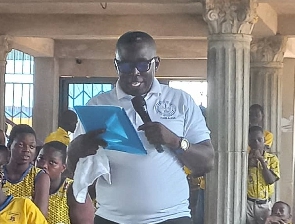The Commission on Human Rights and Administrative Justice (CHRAJ) of Weija-Gbawe Municipal Office, commemorated the International Anti-Corruption day on Friday, December 9, 2022, on the theme "CURBING CORRUPTION IN GHANA THROUGH A ROBUST CONDUCT OF PUBLIC OFFICERS LAW" during an interaction on M-Love Radio, a community development Radio at New Weija, Old Barrier.
During his presentation, Mr. Frank Kwabena Owusu, the Municipal Director of Weija-Gbawe CHRAJ said corruption is using a public office for private gain.
He added that Mr. Kofi Annan, the former UN Secretary-General defined "Corruption as an insidious plague that has a wide range of corrosive effects on societies. It undermines democracy and the rule of law, leads to violations of rights, distorts markets, erodes the quality of life and allows organized crime, terrorism and other threats to human security to flourish."
He further stated that corruption can be curbed if we change our attitudes and prosecute offenders without biases.
According to Mr. Owusu, corruption can be curtailed if we remove red tape and bureaucracy from rendering public services.
He reiterated that the negative effects of corruption on Ghanaians are the provision of poor quality services in areas such as education, health, sanitation and electricity, undermining or weakening of democratic institutions and good governance, increased cost of business, high cost of infrastructural development, destruction of merit-based competition, facilitation of other criminal activities such as drug-trafficking, and human trafficking, terrorism, prostitution, and money laundering. Mr. Owusu asserted that corruption violates the fundamental human rights and freedoms of the citizens and implored stakeholders to help eradicate it.
Additionally, on Monday 10th December 2022 the Weija-Gbawe Municipal Office in partnership with New Generation for Africa Project (NGAP) sponsored the commemoration of Universal Declaration of Human Rights Day, which was held at Obom Domeabra Methodist JHS school compound, under the Theme "The state of Human Rights in our Communities with emphasis on Schools".
During the presentation. Mr. Frank Kwabena Owusu who doubles as the Municipal Director emphasized that rights are claims or entitlements or conditions due every human being. He further stated that rights are not based on colour, ethnicity, tribe, religion, or gender for every human is born with it.
Mr. Owusu underscored that human rights, however, are the principles and laws for protecting individuals or groups to ensure respect for their dignity and well-being; irrespective of their social, cultural, linguistic or religious differences.
He said the concept of human rights means that every person is entitled to the standards or conditions necessary for living a peaceful life.
Lawyer Emmanuel Dubik Mahama, the Chief Operating Officer of New Generation for Africa Project and our major sponsor enumerated the historical antecedent of human rights.
Mr. Mahama opined that human rights have existed since man came into existence, for every human being is born with human rights, and the first significant effort to recognize and protect human rights for all people was the Universal Declaration of Human Rights (UDHR).
According to him, based on the atrocities of the Second World War which to many people was the violation of fundamental human rights, the United Nations General Assembly on the 10th of December, 1948, at the Palais de Chaillot, Paris under the leadership of the wife of the then United States of America's President, Eleanor Roosevelt, adopted the Universal Declaration Of Human Rights (UDHR) which was seen as the expression of rights which all human beings are inherently entitled to.

Throwing more light on the subject, he stated that, it has inspired a rich body of legally binding international human rights treaties, even though it does not have any mechanisms to enforce its provisions directly. He added that the underlying principles of human rights include; equality, non-discrimination, universality, human dignity, indivisibility, inalienability and interdependence.
Mr. Frank Kwabena Owusu in adding his voice stated that corporal punishment is a human right abuse hence school authorities should put an end to it. He also posited that communities and school children should report cases of their rights when it is violated. According to Mr. Owusu, the Commission on Human Rights and Administrative Justice is an institution mandated to protect, promote and enforce fundamental human rights and freedoms under the 1992 Republican Constitution.
Regional News of Wednesday, 14 December 2022
Source: CHRAJ, Weija

















